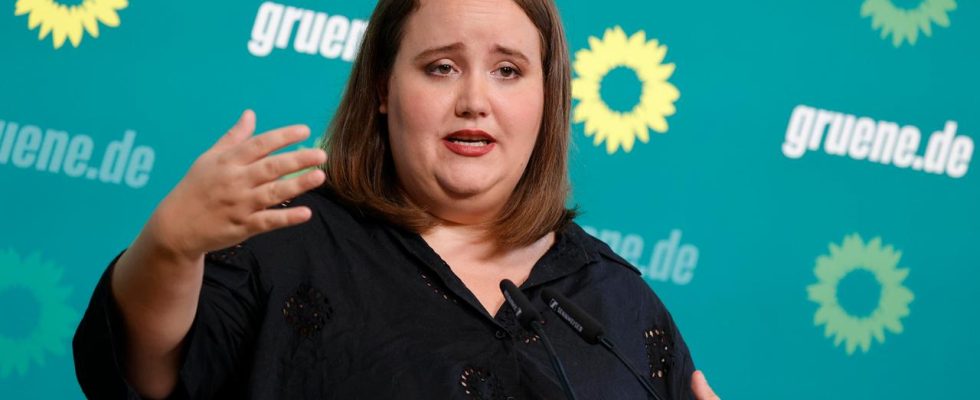In the migration debate, the Greens insist on greater support for municipalities – and at the same time warn against polarization and sham debates. To achieve this, it is important to lift work bans, demanded party leader Lang.
Shortly before the federal-state meeting on migration, the Greens are calling for greater support from municipalities – and at the same time warning against polarization and pseudo-debates.
“Let’s not just talk about what sounds the hardest – but what has the most effect,” said party leader Ricarda Lang rbb. These include more financial support for the municipalities, faster asylum procedures, the reduction of bureaucracy and, above all, the lifting of work bans. “Anyone who can work should be allowed to work,” emphasized Lang. This relieves the burden on the coffers and municipalities and also strengthens integration.
Lang and Baden-Württemberg’s Prime Minister Winfried Kretschmann (Greens) made suggestions for more order in migration policy in a guest article for the “Tagesspiegel” on Wednesday. Lang described this in rbb now as an “offer to return to objectivity”.
Demand for agreement with the Union
For the deputy parliamentary group leader of the Greens in the Bundestag, Agnieszka Brugger, greater support for municipalities is “the most important task”. But at the end of the day this also means more money, she said together Morning magazine from ARD and ZDF. Local people would know about their problems and what they need to tackle. Brugger criticized “sham debates” about restricting services that do not help with the problems facing municipalities.
The Green Party Vice President of the Bundestag, Katrin Göring-Eckardt, also called for greater support from municipalities. Real relief for the municipalities is now important, she told “Welt”. “Polarization and escalation don’t help.” At the same time, she also campaigned for a political understanding with the Union. “We are at a point where we need a democratic consensus on this issue and we need to reach out to each other.”
Scholz consults with Merz and Dobrindt
Chancellor Olaf Scholz is meeting today with Union parliamentary group leader Friedrich Merz and CSU regional group leader Alexander Dobrindt to discuss the issue with them. Both sides have agreed to secrecy. Therefore, no results will likely be announced.
The chairman of the Prime Minister’s Conference, Hesse’s Prime Minister Boris Rhein (CDU), had previously demanded more money from the federal government for refugee care. He told the dpa news agency that in view of the significant increase in the number of migrants nationwide, the federal states would have to spend 17.6 billion euros this year alone. In addition, there would be a further 5.7 billion euros that the municipalities would bear.
According to Rhein, the federal government is only contributing 3.75 billion euros this year and wants to reduce the amount to 1.25 billion euros for 2024. “From the perspective of the states, this is unacceptable because the federal government is leaving the cities and communities alone with their problems.”
“Prime Ministers very agreed”
The Prime Minister wants to discuss financing with Scholz on Monday. The states are “very much in agreement” here across party lines, emphasized Rhein. They called for a return to the so-called breathing system: the more people come, the more the federal government has to pay: “Such a system is only fair, because the federal government alone has the key to controlling and limiting the number of refugees.”
There will also be discussion on Monday about a payment card for asylum seekers instead of cash: “That can reduce the incentive to come to Germany.” But it only makes sense if it is introduced nationwide, said Rhein. In addition, the federal government must conclude more functioning repatriation agreements with other countries.
Holetschek demands concrete results
“We no longer have time for another slide,” said Klaus Holetschek, CSU parliamentary group leader in the Bavarian state parliament, to the “Augsburger Allgemeine”. He made it clear that Scholz’s meeting with the states this time should not end without a concrete result: “If the traffic light government does not manage to solve this central problem, then it is unable to act and must draw the consequences.”
From his point of view, these can only be new elections “because the traffic lights have lost their raison d’être.” Holetschek is calling for, among other things, benefits in kind for asylum seekers instead of cash payments and more speed in the processing of asylum applications.

